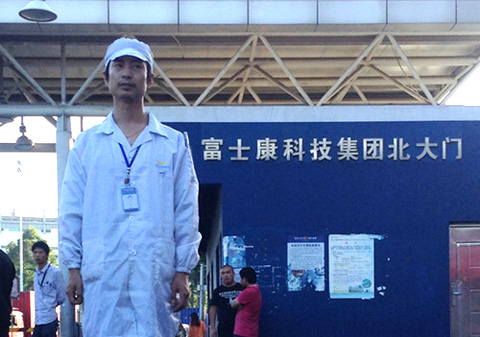The artist and the factory
A Q&A with a fake Foxconn worker
On October 9th 2012, 30 year old Li Liao reported for his first day’s work at a Foxconn factory in Shenzhen, southern China. The behemothian electronics contract manufacturer, which makes our iPhones, Kindles and Wiis, provides a livelihood for hundreds of thousands of poor Chinese. It was also the centre of controversy after a spate of worker suicides in 2010.
Li Liao was issued his identity card – worker F2356272 – overalls and cap. He was shown around. On the assembly line, he was to help manufacture Apple’s latest gadget, the iPad mini. He worked there for 45 days. Then he quit, bought an iPad mini with his wages, and displayed it and his overalls as part of a contemporary art exhibit in the fashionable 798 art district of Beijing.
His boss, presumably, didn’t see that coming.
I caught up with Li Liao, to talk about his experiences at Foxconn. I recognised him from the photos on his identity cards, but his hair was a bright mop of peroxide white.
Why did you dye your hair?
I felt the conditions [at Foxconn] were very oppressive. That’s why as soon as I left, I dyed my hair. There was no feeling of freedom there. You worked for ten hours, and then there were two hours for meals – so twelve hours [at work] in total, and the other twelve hours you slept. It was very tough.
What else where the conditions like?
The work was completely repetitive. If people say their work is repetitive, I think they can still meet different people, or that one day’s work is slightly different from the day before. But at Foxconn every day was the same. To tell the truth, even going to the toilet wasn’t easy. Because when you were on the production line, if you wanted to get up, you had to find someone to replace you. And you couldn’t always be getting up. If wasn’t that you couldn’t go, but you had to give some thought to when and how you went – which was an oppressive feeling.
Do you have an opinion on the suicides?
Sure I have an opinion. Before, I never knew why they killed themselves. Then after I joined the factory, I asked my workmates. They didn’t know either, because workers can’t talk about that affair. But they did know the facts. Then I realised that after one or two people kill themselves, that state of mind is infectious. It makes others think of their similar circumstances.
So why did they kill themselves? Maybe at that time the militarisation and management [of the factory] was pretty strict, and the wages were even lower than they are now. Now, because the labour union came around, to help them achieve an international standard, things are a bit better, so people aren’t jumping off the roof.
So was it to protest, or out of despair?
I think it was mostly out of despair. In my view, if a worker left the factory they didn’t have the skills to survive. Their skills rely entirely on machines. If they leave they are unemployed, and can only go back to their old homes and start a small business. They feel they have no way out.
•


















